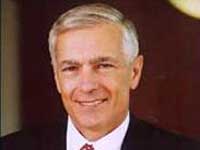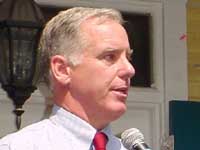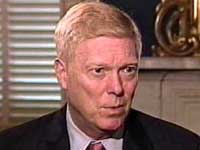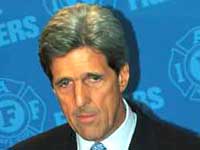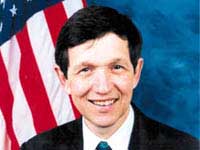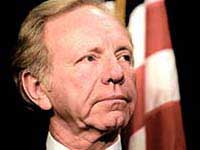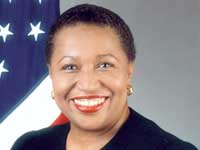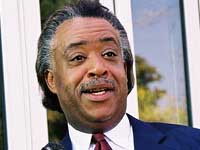-
- Oklahoma gay community criticizing Focus on the Family summit
- Court decision may change vote on anti-gay marriage amendment
- Gay bishop’s safety a concern
- Conservative group pushing ‘marriage protection’ pledge
- Leahy bill would help gay couples stay together
- UA faculty vote to add sexual orientation to anti-bias policy
- Liberal Episcopal priest files lawsuit
- National News Briefs
- World News Briefs
feature
Narrowing the Field
With nine Democrats to choose from, who’s our best bet?
Published Thursday, 30-Oct-2003 in issue 827
While it’s not quite as bad as the flood of candidates for governor in the Calif. recall, there is a definite crowd contending for the Democratic presidential nomination. With nine official candidates at last count — most of whom are courting the GLBT vote — it’s getting hard to keep track of the differences between them. So once again the Gay and Lesbian Times is riding in on its white horse to rescue vexed voters.
The candidates
Of course, the first thing you need to know is who’s actually in the running for the Democratic nomination. At this point, the list includes: Wesley Clark, Howard Dean, John Edwards, Richard Gephardt, John Kerry, Dennis Kucinich, Joseph Lieberman, Carol Moseley Braun and Al Sharpton.
According to the latest Zogby poll, Dean holds a slight lead over Clark, Kerry and Lieberman, with Gephardt and Moseley Braun fighting for fifth place and the others trailing. But with 38 percent of poll respondents undecided, and months until the primary elections, it’s still anyone’s game.
“I believe we must allow civil unions to guarantee full and equal protection of the law. It’s basic decency — giving people protections that everybody should have.” — Dick Gephardt
However, there are some standout candidates. The most obvious is Howard Dean, who, as Governor of Vermont, signed the first (and so far the only) U.S. civil unions legislation into law. At this point in the race, Dean seems to have the strongest official GLBT backing – he’s already been endorsed by the Stonewall Democratic Club, California Teachers Association, San Diego Democratic Club and San Diego City Councilmember Toni Atkins, just to name a few.
“We actually did a straw poll of our membership back in June, and Howard Dean was very, very far ahead of all the others,” said Jess Durfee, president of the San Diego Democratic Club (SDDC). At the SDDC meeting on Oct. 23, members voted to officially endorse Dean as Democratic presidential candidate. “In the first round of voting Howard Dean had over sixty-percent so we declared him endorsed and we were done.… I don’t think Dean’s popularity is exclusive to the GLBT community. In New Hampshire he is showing a huge lead over John Kerry, who is the number two candidate in New Hampshire, and if you poll party activists or people who are closely involved, Howard Dean is showing strong support all across the country.
“We are recommending that the local GLBT community and others vote for Howard Dean in California’s presidential primary on March 2,” said Jess Durfee in a press release. “Dean is a good friend of our community. And if he wins the Democratic nomination, we believe he would beat George Bush in the general election next November.”
Wesley Clark and John Kerry were the runners-up in the SDDC vote, but they received little support from members. Still, Durfee concedes that Kerry and Clark are strong contenders.
“Kerry’s got years of Washington, D.C. expertise as a senator, he has a military record, he was a decorated hero during Vietnam,” Durfee said. “He’s also got good connections and a lot of money and those are good things in politics these days; they are almost necessities.… Wesley Clark, he’s a new face and people find that appealing, which is also a big factor for Howard Dean, because other than having been Governor of Vermont he is not part of the Washington establishment or inside beltway circle. So Howard Dean [and Clark] are both sort of bringing that new person in the field appeal to the campaign, which is exciting.… Sort of like the Arnold Schwarzenegger factor here in California.”
According to Political Affairs Director Rosemary DaSilva, the California branch of the National Organization for Women — another good predictor of liberal support — has not yet endorsed a candidate, due mainly to delays caused by the recall election.
“We haven’t made any endorsements yet,” said DaSilva. “We’re in the process of looking at the races; it’s kind of hard to say [when we will endorse] — it depends on when we can get all the information from the candidates.… Last year we didn’t make our decisions until the end of January.… I’ve actually been talking to people and I know that people are just now getting around to it. The recall really put a lot of us behind. I know [NOW] wants to make early endorsements and we wanted to get involved sooner.”
The theories
“I can’t wait to ask the President of the United States why he doesn’t support equal rights. I can’t wait to ask him to repudiate the GOP-authored Defense of Marriage Act, an unconstitutional, mean-spirited law that stoked fears of homosexuality and pitted one group of Americans against another.” — Howard Dean According to David Brooks, writing for the New York Times, “Howard Dean argues that the Democratic Party has lost its soul. If it returns to its true fighting self, instead of compromising with Republicans, it will energize new and otherwise disenchanted voters.
“Dick Gephardt argues that the party has lost touch with the economic interests of working men and women. Instead of offering bread-and-butter benefits to lower-middle-class workers, it endorses free trade policies that destroy job security.
“Joe Lieberman argues that the party has become too liberal and too secular. It has lost touch with the values of the great American middle.
“John Edwards has the most persuasive theory,” Brooks concludes. “He argues that most voters do not place candidates on a neat left-right continuum. But they are really good at sensing who shares their values. They are really good at knowing who respects them and who doesn’t. Edwards’s theory is that the Democrats’ besetting sin over the past few decades has been snobbery.”
The frontrunners
Howard Dean is still holding a clear lead over the other candidates, and is the most outspoken supporter of GLBT rights. There are those who say he’s simply too angry to be President, but it could be that he’s simply trying to show his fighting spirit and refusal to “compromise with Republicans.” If his advisers are any good, they’ll pick up on these murmurings and recommend a lighter touch.
Dean’s civil rights statement is very direct, including the following:
“I will support affirmative action, from which we have all benefited, because it has strengthened our institutions and provided opportunity. I will unflinchingly defend a woman’s right to choose against those who would take away this right. I will nominate federal judges with outstanding legal credentials, records of professional excellence, and demonstrated commitment to the constitutional principles of equality, liberty, and privacy.
“I will work to expand equal rights to same-sex couples and ban workplace discrimination based on sexual orientation, strengthen federal protections against anti-gay violence, give federal employees the right to name same-sex partners as beneficiaries, remove bias from our immigration laws, and end the military’s “Don’t Ask, Don’t Tell” policy.
“I will work to ensure that racial profiling ends and I will direct my Attorney General to use regulatory authority under existing anti-discrimination laws to define racial profiling as discrimination, and to withhold federal funds from state and local law enforcement that violate those regulations.
“I will appoint an Attorney General who sees our constitution not as a document to be manipulated, ignored, and violated, but who recognizes and respects it as the fabric that binds the American community together.
“The Republican Party seems eager to run against me because of my role in the enactment of this historic law,” he states elsewhere on his web site. “I welcome that debate — I can’t wait to ask the President of the United States why he doesn’t support equal rights. I can’t wait to ask him to repudiate the GOP-authored Defense of Marriage Act, an unconstitutional, mean-spirited law that stoked fears of homosexuality and pitted one group of Americans against another. I’m tired of being divided. America is better than that.”
Wesley Clark is the dark horse of the race so far. He entered late, he’s former military, he’s in the NATO “Who’s Who,” and he has a surprisingly liberal approach. He is an intriguing candidate, but as he has no history in politics it’s impossible to know exactly where he stands on GLBT issues or how hard he is willing to fight for those principles. He could be a wily one — all ideals and no conviction. It’s just too soon to tell. At the moment he is gaining in popularity and narrowing Dean’s first place lead.
On his campaign web page Clark sums up his stand on civil rights with the following:
“If we are to remain competitive we will have to do more to develop our ‘human potential.’ To put it in a more familiar way, we should help every American to ‘be all he or she can be.’ For some this means only providing a framework of opportunities — for others it means more direct assistance in areas such as education, health care, and retirement security. And these are thirty year challenges — educating young people from preschool until they are at their most productive, helping adults transition from job to job and profession to profession during their adult lives; promoting physical vigor and good health through public health measures, improved diagnostics, preventive health, and continuing health care to extend longevity and productivity to our natural limits; and strengthening retirement security, simply because it is right; first for our society to assure that all its members who have contributed throughout their lifetimes are assured a minimal standard of living, and secondly to free the American worker and family to concentrate on the challenges of today.
“Such long-term challenges must be addressed right away, with a new urgency.… All Americans are better off when we ensure that each American will have fundamental educational skills and access to further educational development throughout their lives; that each American will have access to the diagnostic, preventive and acute health care and medicines needed for productive life, as well as some basic level of financial security in his or her retirement.”
He kite surfs, plays a Gibson guitar, and has appeared onstage with Moby. If it were up to MTV, John Kerry would likely have been pronounced the presidential heir-apparent already. His civil rights record is excellent and he has put his neck on the line for the GLBT community – most notably in his opposition to the Defense of Marriage Act. Still, he seems a little wobbly on same-sex marriage or even civil unions, only going so far as to state that GLBT families should have “basic legal protections that all families and children should have,” without elaborating.
According to his campaign web site, “Kerry has had a 100 percent rating from the Human Rights Commission since 1995, and is an original cosponsor of the Hate Crimes Prevention bill, which would extend federal jurisdiction over serious, violent hate crimes, including crimes motivated by sexual orientation.
“One of his first acts as a U.S. Senator was to introduce a bill prohibiting discrimination on the basis of sexual orientation. He supports passage of the Employment Non-Discrimination Act, and has adopted a nondiscrimination policy for his Congressional offices based on sexual orientation and gender identity.
“He cosponsored the first Ryan White Comprehensive AIDS Resources Emergency Act (CARE), and the Vaccines for the New Millennium Act, aimed at boosting contributions to the International AIDS Vaccine Initiative, a non-profit group working to promote development of an HIV vaccine in 2000.
“He believes that same-sex couples should be granted rights, including access to pensions, health insurance, family medical leave, bereavement leave, hospital visitation, survivor benefits, and other basic legal protections that all families and children need. He has supported legislation to provide domestic partners of federal employees the benefits available to spouses of federal employees. He was one of 14 Senators — and the only one up for reelection at the time — to oppose the Defense of Marriage Act (DOMA).
“Kerry was one of a few senators to testify before the Senate Armed Services Committee and call on the President to rescind the ban on gay and lesbian service members.”
Lieberman has a good civil rights record, but it’s hard to imagine that anyone who feels that the Democratic Party has become “too liberal and too secular” is going to go out of their way to make great strides in the civil rights arena — or make advances for the GLBT community, for that matter. He is against the extreme right wing, but he doesn’t seem fond of the left, either.
Lieberman’s campaign web site includes the following:
“As it says in our Declaration of Independence, we are all created equal and endowed by our Creator with the inalienable right to life, liberty, and the pursuit of happiness. Joe Lieberman believes that each generation of Americans is faced with the challenge of extending that promise of America to all of God’s children, and that the challenge facing our generation is how to extend the circle of freedom to gay and lesbian Americans. That is why he has stood up for fairness and dignity for all Americans.
“Throughout his career, Lieberman has stood up and fought discrimination against gay and lesbian Americans. He has brought this commitment to equality to the United States Senate where he has been a longtime co-sponsor of the Employment Non-Discrimination Act (ENDA).
“In 1990, he co-sponsored the Hate Crimes Statistics Act that launched the first effort to collect data on hate crimes and prodded the FBI to train state and local law enforcement officials about hate crimes. Lieberman is also the co-sponsor of the Hate Crime Prevention Act to expand the definition of hate crimes to include sexual orientation and to make it easier to prosecute hate crimes under federal law.
“He opposed legislation banning gay men and lesbians from serving in the military. In addition, he opposed Jesse Helms’ effort to allow public school facilities to be used by organizations that discriminate against gays and lesbians.
“He believes that presidential appointees must represent the mainstream of America. That is why he has opposed several Bush appointees that have extreme right-wing views.
“In 1990, he was an original co-sponsor of the Ryan White Comprehensive AIDS Resources Emergency (CARE) Act and has cosponsored both reauthorizations of the bill. He stood up and voted against an effort by the right-wing to cut off funding to local gay community health centers that provide care to men, women and children with HIV and AIDS.”
Gephardt has a solid record of political effectiveness, and has long supported GLBT causes, as well as civil rights in general. He also has a lesbian daughter, who has been working on his campaign and is openly acknowledged, along with her partner, on his campaign web site. You’d think he would be a liberal shoo-in, but he’s barely among the top five candidates. Maybe he’s just not distinct enough.
On his campaign web site he states that, “America has made significant progress in protecting the civil rights of individuals, but we must end discrimination and ensure fair and equal treatment of everyone regardless of race, gender, religion, national origin or sexual orientation. I will lead the fight for equal rights for gays and lesbians from the White House.”
As House Democratic Leader, Gephardt was recognized for fighting off an onslaught of anti-gay legislation, including those who sought to stop the District of Columbia from allowing joint adoption by gay couples. He is now the cosponsor of legislation that would allow U.S. citizens and legal residents to sponsor their permanent partners for residency in the United States.
He supports lifting the ban on gays in the military and allowing gays and lesbians to be open about their sexual orientation and serve in the U.S. military.
He supports civil unions for gay and lesbian couples, and has endorsed domestic partner benefits for federal employees. He voted to provide federal recognition of state-sanctioned civil unions or civil marriages. He is a champion of increased funding for HIV/AIDS treatment, prevention, research, and housing, and has consistently supported needle exchange programs to stop the spread of HIV.
The conclusion
At this point, Howard Dean still seems to have the best chance. He’s leading in the polls, he has experience as an effective political leader, and he’s got that populist touch. He’s also nearly the opposite of President Bush, which will work well for him in some areas. Dean is particularly attractive to the GLBT community and other minority communities because of his stand on civil rights issues.
Wesley Clark is still something of an unknown. He sounds good in general, but it’s hard to pin down exactly where he stands on some issues. The fact that he’s highly respected ex-military but remains critical of some military policies will probably work in his favor, making him attractive to more conservative Democrats and possibly some Republicans.
Kerry has all the necessary ingredients of a very strong candidate. He has an excellent record, he connects well with the public and he seems to have an actual plan for making changes. He even makes a great media package. His biggest stumbling block may be his many years in the U.S. Senate — it gives him valuable experience and connections, but he may be seen as too much of a Washington insider.
Lieberman simply isn’t offering anything very different from the status quo. He has a good record, but he’s taking an approach that seems to say, “I may be a Democrat, but I may as well be a Republican.”
|
|
Copyright © 2003-2025 Uptown Publications


